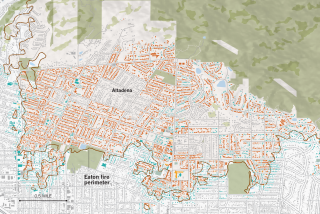In battling racist policies, taking down the Confederate flag is barely a first step

Activist Bree Newsome removes the Confederate battle flag from a monument at the South Carolina Statehouse in Columbia on June 27.
- Share via
The power of a symbol should never be underestimated, but it shouldn’t be overestimated either. That’s the case with the Confederate battle flag, which is coming down from public venues all across the South and off retailers’ shelves across the nation.
Politicians who have reversed themselves after years of fighting against the flag’s removal or treating its presence with indifference are being praised for their courage. Initiatives to take the flag down from the Statehouse grounds in South Carolina or remove it from the state flag of Mississippi are being cited as signs of a new consciousness of the toll of official racism.
The danger is that the eradication of such institutionalized racism will only go as far as the symbol. Relatively speaking, symbolic acts are easy. They don’t cost anything, they don’t hurt anyone and, when sufficiently widespread, they provide political cover.
The real challenge is to follow them up with material change. Lyndon Johnson wasn’t shy about evoking the symbolism of John F. Kennedy’s supposed legacy in pushing for civil rights legislation immediately after the Kennedy assassination; but he knew that getting the laws passed would require every ounce of persuasion, threats and political capital he could muster. Take a look at the accompanying photo of LBJ physically intimidating Sen. Richard Russell (D-Ga.) over the Civil Rights Act. “I’m going to pass it, Dick,” he told Russell, his onetime Senate mentor, “and if you get in my way, I’m going to run you down.”
State laws and procedures, especially in the South, are rife with political and economic discrimination, subtle and otherwise. Even if some of these policies can be defended as not overtly racially motivated, their racially discriminatory effect is plain.
The region is the epicenter of opposition to the Affordable Care Act; among Southern states, only Arkansas has expanded Medicaid, the provision of Obamacare most specifically directed at low-income Americans, a group in which black residents are overrepresented.
Eleven Southern states, among 22 nationwide, enacted new voting restrictions after the 2010 election. Florida, Texas, and Virginia imposed new restrictions on voter registration drives, through which black and Latino citizens register at twice the rate of whites. Studies from the University of Massachusetts and USC have concluded that racial bias typically underlies restrictive voter ID laws. The Supreme Court this year will hear a Texas case threatening to dilute the voting clout of urban residents, including black and Latino voters.
South Carolina, the birthplace of the new movement to take down the Confederate battle flag, shows the gap between symbol and reality. In calling for the flag’s removal from Statehouse grounds, Gov. Nikki Haley acknowledged that although the flag was for many people “a way to honor ancestors, ... for many others in South Carolina, the flag is a deeply offensive symbol of a brutally oppressive past.” This was less than a full-throated condemnation of all the flag stood for, but Haley nonetheless was hailed for her valor. President Obama, at his eulogy for the slain Rev. Clementa Pinckney, called her “eloquence on the subject ... worthy of praise.”
Yet there’s been no sign that she’s willing to reverse her opposition to the Affordable Care Act and Medicaid expansion, which has manifestly racist effects. Under Haley, South Carolina adamantly refused to create a state insurance exchange or expand Medicaid. She claimed that the expansion would cost her state as much as $2.3 billion over six years, which appears to exaggerate the cost of the largely federally funded expansion as much as fourfold. She called Medicaid “a broken program ... that stifles innovation, discourages personal responsibility and encourages fraud, abuse and overuse of services,” none of which is true.
Of the nearly 300,000 South Carolinians who would be eligible for Medicaid if the state accepted expansion, more than 43% are black, according to the South Carolina Hospital Assn. The African American proportion of state residents is 28%, showing that blacks are especially disadvantaged by Haley’s policy.
As for her refusal to create a state insurance exchange, that action risked exposing 154,000 low-income residents to the loss of federal insurance subsidies -- more than tripling the average cost of insurance to those recipients -- if the Supreme Court had ruled against the government last week in the King vs. Burwell case. Not only was South Carolina’s government indifferent to this toll, it even joined in an amicus brief urging the court to take that step.
South Carolina also has been an epicenter of racially motivated restrictions on voting; it was the subject of a 1966 Supreme Court case that upheld the federal government’s authority to demand advance approval of voting law changes under the Voting Rights Act of 1965. Under that authority, the government blocked a 2011 South Carolina voter ID law that it said would leave many minority voters “effectively disenfranchised.” The Department of Justice eventually approved the law after it was materially loosened. South Carolina was helped by a 2013 Supreme Court ruling that gutted the Voting Rights Act’s provision giving the government advance approval rights in such cases.
Similar conditions prevail in other states congratulating themselves for taking a new look at public displays of the Confederate battle flag, such as Mississippi and Georgia. Both have imposed new voting requirements that raise bars to low-income voters; both refused to expand Medicaid or establish their own insurance exchanges.
It’s encouraging to see politicians and citizens waking up to the noxious symbolism of leaving the Confederate battle flag flying in public spaces. But simply removing a racist symbol doesn’t in itself signify an end to racial policy. The next steps are the important ones: a rollback of restrictive voting laws that evoke the era of poll taxes and election-day violence, and the expansion of health coverage to all citizens. Unless and until they happen, the symbolism of taking down the flag will be empty.
Keep up to date with the Economy Hub. Follow @hiltzikm on Twitter, see our Facebook page, or email [email protected]







